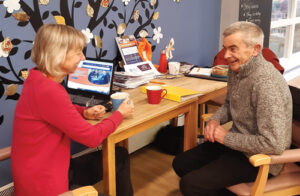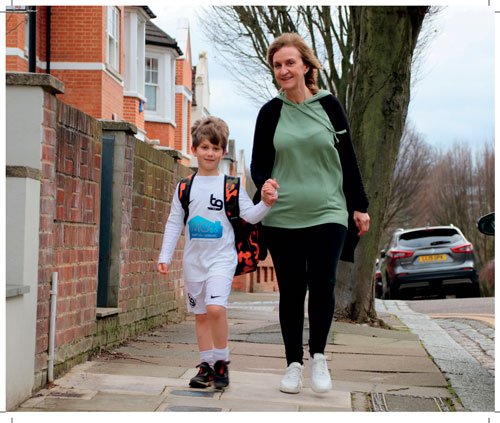
by Katie Gowers Watts
‘Diary of a Warent’ blogger
As a parent, your definition of success can change entirely.
Despite being a complex person emotionally, I didn’t take my first pregnancy very seriously – until it ended in a silent miscarriage. We had been for an ultrasound scan the week before and reassuringly seen a tiny, beating heart on the monitor. Sadly, one week later we saw nothing but a static, grey image.
In that moment, my version of success pivoted entirely. The only thing I really wanted, was to be able to successfully carry my child.
It’s embarrassing to confess, but in the past, I didn’t respect women who chose not to go back to work after having children. I thought of it as a cop out. I’m ashamed of that now. For those who subscribe to ‘stay-at-home stereotypes’ like I did, WOW, looking after children all day long is hard. Really hard.
Being a perma-entertainer and safe-keeper, never EVER switching off, and the sheer monotony and thanklessness of housework is so much harder than ‘work work’.
Even playing is arduous. Fumbling around in the attic of your adult mind for the dusty old imagination you stored away many years ago. The definition of child’s play is ‘a task which is easily accomplished’. I’m here to tell you that playing with children is not child’s play. It’s exhausting!
Importantly, being a stay-at-home parent comes from a place of love (or financial necessity because childcare can break the bank). It’s not laziness or lack of ambition. It took me 36 years to figure that one out.
My two children are without a shadow of a doubt, my greatest achievement. So, having recently welcomed baby number two who brings me unadulterated joy, why don’t I feel successful anymore?
Many of us define our success based on what others think of us. Or more specifically, our assumptions of what they think. Will people be suitably impressed by my accomplishments, my job title, my salary (or indeed envious of them if one’s ego needs a stroke)? If yes, then bingo, we feel successful.
Success wears many hats.
Something we all need to acknowledge is that actually, success wears many hats. Professional success, financial success, parenting success, relationship success, family success. Sometimes it’s just ‘keeping your sh*t together’ success. What matters is how we define our own success, and in turn, respecting each other’s unique versions. If I’m wearing a baseball cap today, that doesn’t mean you can’t wear a trilby.
Right now, rudely interrupting my marvellous motherhood moments, is the fact that somehow my sense of accomplishment is diminished.
I question myself ALL the time. Am I adding enough value – to my family, to our bank balance, to my employer? I feel like I’m in debt.
As a bona fide warent (working parent), I cast aside all the other hats in my success wardrobe, in search of my ‘professional success hat’. The hat that people admire the most. But it doesn’t fit me right now.
Despite having fire in my belly and craving professional success once again, I’m scared. I’m not ready to leave my baby yet; I want to be a present mum – but, I’m also afraid of the alternative. Of having already stunted my success, of being left behind and of missing out on opportunity to be professionally brilliant. I really want both. But we can’t wear two hats at exactly the same time, can we?
My heart tells me to focus solely on our chubby little bundle of joy. Somebody recently told me, “You will never regret spending more time with your kids”.
Surrounding myself with love and this unbelievable family we have created is a HUGE, everlasting success. A hat that I’ll never outgrow. I know that.
But, my (annoying) head tells me I need to get back to work and back in the game. My professional success hat has been sitting around in the wardrobe so long that it’ll be moth-eaten by the time I take it out and shove it back on.
So, I’ve taken a step back to properly look at myself. To open every drawer of my mind and rummage through my collection of hats.
I tried my ‘stay-at-home success’ hat on for size, and I like it. It’s one of those understated, comfortable pieces of clothing that you’ll never throw out, so I’ve been wearing it for a while – but it’s not in vogue. From time to time, I put my more impressive ‘professional success’ hat back on and walk around the house in it to make myself feel busy and important (I’m wearing it as I write this). And when I get bored, I try on every single hat in the wardrobe and end up with nothing but ‘hat hair’.
It seems obvious now, that my ‘family success’ hat will never, ever go out of fashion. The others are perhaps more seasonal.
Here’s the most important thing I’ve figured out. Self-deprecation is the opposite of success. It has literally no useful purpose. It’s a paper hat when you’re out in the rain. Self-respect is success in its purest, most impressive form. It’s a frickin’ bejewelled gold crown, sparkling in the sunshine.
 For those of us ‘warenting’ our way through life, impossibly striving to be perfect parents AND perfect professionals, remember that success belongs to YOU. It’s yours to define. Own it.
For those of us ‘warenting’ our way through life, impossibly striving to be perfect parents AND perfect professionals, remember that success belongs to YOU. It’s yours to define. Own it.
For now, I have redefined my version of success. Because it’s not a static, grey image. It’s a beating heart.
You can read the full version of ‘Success wears many hats’ and additional ‘warenting’ blogs written by Katie, at www.diaryofawarent.com


 Although it can be rewarding, and deepen relationships, caring can also be extremely hard, and will often affect someone practically, socially, emotionally, and financially.
Although it can be rewarding, and deepen relationships, caring can also be extremely hard, and will often affect someone practically, socially, emotionally, and financially. Your employment rights
Your employment rights















